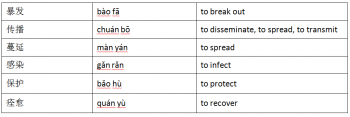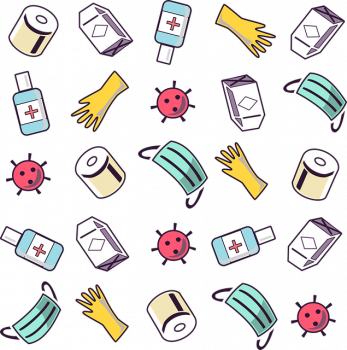COVID-19 Chinese Vocabulary Posted by Ayana on May 16, 2020 in Vocabulary
Talking and reading about the COVID-19 in Chinese requires a specific vocabulary. Here is a glossary of 15 words, including related verbs and nouns. Read the sentences all regarding the COVID-19 pandemic, to practice the new vocabulary. Try to make sentences on your own, using the glossary. If you have any question leave me a comment.
Pronouns

- 世卫组织早在今年一月初就已明确疫情的风险非常高。
Shì wèi zǔ zhī zǎo zài jīn nián yī yuè chū jiù yǐ míng què yì qíng de fēng xiǎn fēi cháng
gāo.
As early as January of this year, WHO has made it clear that the risk of the epidemic is very high.
- 世卫组织宣布这一新疾病的名称为“2019冠状病毒病”。
Shì wèi zǔ zhī xuān bù zhè yī xīn jí bìng de míng chēng wèi “2019 guān zhuàng bìng
dú bìng”.
WHO announced the name of this new disease as “Coronavirus 2019”.
- 世界卫生组织正式宣布新型冠状病毒肺炎成为“大流行病”。
Shì jiè wèi shēng zǔ zhī zhèng shì xuān bù xīn xíng guān zhuàng bìng dú fèi yán chéng
wéi “dà liú xíng bìng”
The World Health Organization officially announced that the new coronavirus pneumonia has become a “pandemic”.
- 中国政府选择清明节这一天,悼念新冠疫情中去世的烈士和平民。
Zhōng guó zhèng fǔ xuǎn zé Qīng Míng jié zhè yī tiān, dào niàn xīn guān yì qíng
zhōng qù shì de liè shì hé píng mín.
The Chinese government chose the day of Qing Ming Festival to mourn the martyrs and civilians who died in the corona epidemic.
- 当天,武汉市卫生健康委员会共报告无症状感染者500人。
Dàng tiān, Wǔhàn shì wèi shēng jiàn kāng wěi yuán huì gòng bào gào wú zhèng
zhuàng gǎn rǎn zhě 500 rén.
On that day, the Wuhan Municipal Health Commission reported a total of 500 people with asymptomatic infections.
- 习总书记对作出重要指示。
Xí zǒng shū jì duì zuò chū chóng yào zhǐ shì.
General Secretary Xi made important instructions.
Nouns
- 大部分的患者会在感染后12天内出现症状。
Dà bù fèn de huàn zhě huì zài gǎn rǎn hòu 12 tiān nèi chū xiàn zhèng zhuàng.
Most patients will develop symptoms within 12 days of infection.
- 各国的医疗水平不同,因此不同地方的患者得到的治疗水平也不同。
Gè guó de yī liáo shuǐ píng bù tóng, yīn cǐ bù tóng dì fāng de huàn zhě dé dào de zhì
liáo shuǐ píng yě bù tóng.
Each country has different standards of medical care, so patients in different places receive different levels of treatment.
- 患者最近两次的检测结果均呈阴性。
Huàn zhě zuì jìn liǎng cì de jiǎn cè jié guǒ jūn chéng yīn xìng.
The patient’s last two tests results turned out negative.
- 意大利是累计确诊病例较多的国家。
Yìdàlì shì lěi jì què zhěn bìng lì jiào duō de guó jiā.
Italy is a country with a rather large number of confirmed cases.
- 为降低感染风险,在日常生活中尽量保持社交距离。
Wèi jiàng dī gǎn rǎn fēng xiǎn, zài rì cháng shēng huó zhōng jǐn liàng bǎo chí shè jiāo
jù lí.
To reduce the risk of infection, try to maintain social distance in daily life as much as possible.
Verbs

- 自从去年12月新型冠状病毒在中国暴发之后,全球各国都已有确诊感染病例。
Zì cóng qùnián 12 yuè xīn xíng guān zhuàng bìng dú zài Zhōng guó bào fā zhī
hòu, quán qiú gè guó dū yǐ yǒu què zhěn gǎn rǎn bìng lì.
Since the outbreak of a new coronavirus in China last December, there have been confirmed cases of infection in countries around the world.
- 这位患者去过疫情暴发的源头武汉。
Zhè wèi huàn zhě qù guò yì qíng bào fā de yuán tóu Wǔhàn.
This patient has been in Wuhan, the source of the outbreak.
- 冠状病毒是如何传播的?
Guān zhuàng bìng dú shì rú hé chuán bō de?
How does the coronavirus spread?
- 自然界中病毒种类繁多,偶尔也会跨越种群,传播给人或者其他动物。
Zì rán jiè zhōng bìng dú zhǒng lèi fán duō, ǒu ěr yě huì kuà yuè zhǒng qún, chuán bò
jǐ rén huò zhě qí tā dòng wù.
A wide range of viruses exist in nature and occasionally they can spread across populations, transmitting to humans or other animals.
- 这种病毒正在向越来越多的社区蔓延。
Zhè zhǒng bìng dú zhèng zài xiàng yuè lái yuè duō de shè qū màn yán.
The virus is spreading to more and more communities.
- 各个年龄段的人都可能被感染。
Gè ge nián líng duàn de rén dōu kě néng bèi gǎn rǎn.
People of all ages can be infected.
- 到底有多少人被感染了?
Dào dǐ yǒu duō shǎo rén bèi gǎn rǎn le?
After all, how many people are infected?
- 为了保护自己免受感染威胁经常性彻底地洗手。
Wèi le bǎo hù zì jǐ miǎn shòu gǎn rǎn wēi xié jīng cháng xìng chè dǐ de xǐ shǒu.
Wash your hands frequently and thoroughly to protect yourself from infectious threats.
- 保持社交距离,不仅可以保护自己,还可以减缓病毒的传播速度。
Bǎo chí shè jiāo jù lí, bù jǐn kě yǐ bǎo hù zì jǐ, hái kě yǐ jiǎn huǎn bìng dú dí chuán bò
sù dù.
Keeping social distance can not only protect yourself, but also slow down the spread of the virus.
- 66岁的女性的患者已经痊愈。
66 suì de nǚ xìng de huàn zhě yǐ jīng quán yù.
The 66-year-old female patient has recovered.
大家都健康平安!

Build vocabulary, practice pronunciation, and more with Transparent Language Online. Available anytime, anywhere, on any device.






Leave a comment: